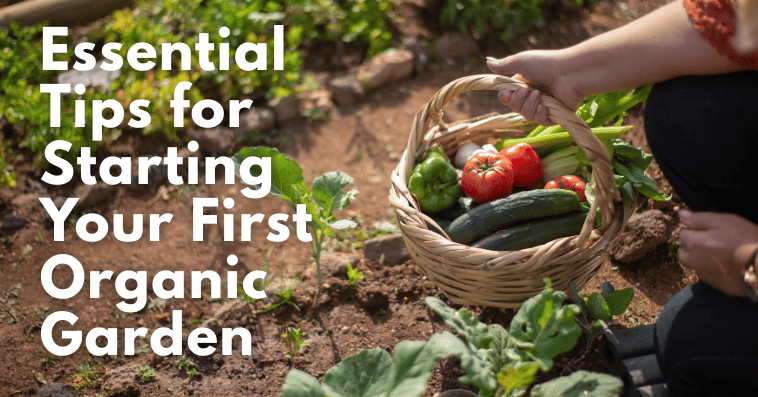Dreaming of biting into a juicy, homegrown tomato or plucking herbs straight from your balcony? Starting an organic garden is one of the most rewarding and sustainable hobbies you can take up. Not only does it give you pesticide-free produce, but it also contributes to a healthier lifestyle and a greener planet.
But where do you begin if you're a complete beginner?
This step-by-step guide will walk you through everything you need to know about starting your first organic garden—from soil to seeds to success. Whether you have a backyard, terrace, or just a few containers, these tips will help you grow a flourishing organic garden right at home.
🪴 1. Understand What Organic Gardening Means
Before digging in, let’s get one thing clear: organic gardening means growing plants without synthetic chemicals, pesticides, or fertilizers.
It’s all about using:
- Natural composts and manures
- Biological pest control
- Eco-friendly gardening practices
The goal? To work with nature, not against it, for healthier soil, cleaner produce, and a more sustainable ecosystem.
🌱 2. Start Small and Choose the Right Spot
When you're just starting out, it’s tempting to go big. But starting small helps you stay consistent and learn gradually.
What to consider:
- Sunlight: Most vegetables and herbs need 6–8 hours of sunlight daily
- Accessibility: Choose a spot that’s easy to reach and water regularly
- Protection: Ensure the area is safe from strong winds and harsh rain
If you're working with limited space, container gardening or raised beds are great options for beginners.
🧪 3. Test and Enrich Your Soil
Healthy soil = healthy plants. That’s especially important when going organic.
Use a basic soil testing kit to check:
- pH level
- Nutrient content
- Soil texture (loamy is best)
Once tested, enrich the soil using organic amendments such as:
- Compost
- Vermicompost
- Cocopeat
- Cow dung manure
Avoid chemical fertilizers—opt for natural soil boosters that improve structure and microbial life.
🌾 4. Choose Easy-to-Grow Organic Plants
Not all plants are beginner-friendly. Choose plants that are low-maintenance and quick to grow, so you gain confidence as you learn.
Great organic plants for beginners:
- Spinach
- Basil
- Chillies
- Mint
- Radish
- Coriander (Cilantro)
- Tomatoes
Buy certified organic seeds or heirloom varieties to ensure purity and strong resistance to pests.
💧 5. Master the Art of Organic Watering
Watering seems simple—but when done right, it makes a huge difference.
- Organic watering tips:
Water early morning or evening to reduce evaporation - Avoid overwatering—check the top 1 inch of soil before watering again
- Use mulch (more on this later) to retain moisture
- Install a drip irrigation system for consistent hydration
Remember, watering less frequently but deeply encourages stronger root systems.
🐛 6. Say No to Pesticides—Try Natural Pest Control
Pests are part of gardening—but you don’t need harsh chemicals to fight them. Go for natural, homemade pest control methods.
Natural pest control options:
- Neem oil spray
- Garlic-pepper spray
- Soap water
- Introduce beneficial insects like ladybugs
Plant companion plants like marigold, basil, or garlic to naturally repel common pests.
🍌 7. Feed Your Plants With Organic Fertilizers
Plants need food too—but skip the chemical-rich options.
Use organic fertilizers like:
- Banana peel compost tea
- Seaweed extract
- Bone meal and fish emulsion
- Vermicompost
Feed your plants every 2–4 weeks, depending on the plant type and stage of growth. Always water before and after fertilizing to prevent root burn.
🌾 8. Mulch for Moisture and Weed Control
Mulching is your secret weapon to retain moisture, suppress weeds, and regulate soil temperature.
Use organic mulch materials such as:
- Dried leaves
- Coconut husk chips
- Straw or hay
- Grass clippings
Apply a 2–3 inch thick layer around your plants—just avoid piling it on the stem.
🪓 9. Use Organic Gardening Tools and Containers
The right tools make gardening easier. Stick to eco-friendly options that are durable and safe for soil health.
Invest in:
- Stainless steel hand tools
- Biodegradable grow bags
- Terracotta or ceramic pots
- Compost bins
Avoid black plastic pots, which can heat up too much and damage roots.
📅 10. Be Patient and Observe Regularly
Organic gardening is about learning and growing together with your plants. It takes time to understand what works best for your space and climate.
Check your garden daily for:
- Signs of pests
- Water needs
- Yellowing leaves
- Harvest timing
With time and care, your garden will reward you with fresh, chemical-free harvests and immense joy.
🌿 Why Start an Organic Garden?
Here’s why organic gardening is worth every bit of your effort:
✅ Safer produce for your family
✅ Lower environmental impact
✅ Improved soil and air quality
✅ Lower gardening costs over time
✅ Therapeutic and stress-relieving hobby
And the best part? You control what goes into your food.
🛒 Where to Get the Best Organic Gardening Supplies?
Ready to start your organic gardening journey?
Make it easy with certified organic seeds, eco-friendly planters, compost, and sustainable tools—all from one trusted place.
🌱 Buy everything you need to grow your first organic garden from PaudheWale.
They offer affordable, sustainable, and beginner-friendly gardening products delivered right to your doorstep.

